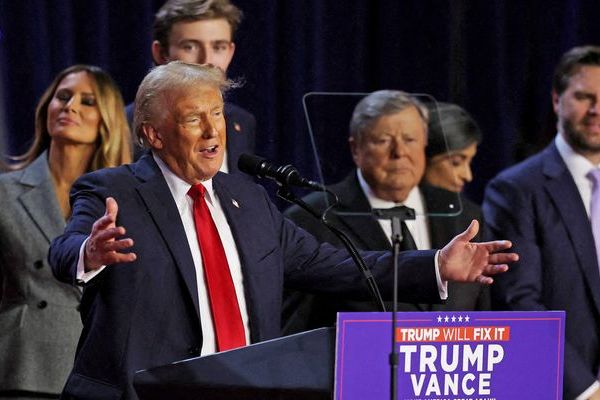
![]()
Donald Trump was elected the 47th president of the United States in an extraordinary comeback for a former president who refused to accept defeat in 2020, before he sparked a violent insurrection at the U.S. Capitol, was convicted of felony charges and survived two assassination attempts.
With his win in the state of Wisconsin, Trump cleared the 270 electoral votes needed to clinch the presidency.He attacked his Democratic rival, Kamala Harris, in often deeply personal, misogynistic racist rants as he pushed an agenda with a message that the US is overrun by violent migrants.
The manic rhetoric, resonated with angry voters – particularly men – in a deeply polarised nation.
“We’ve been through so much together, and today you showed up in record numbers to deliver a victory,” Trump told throngs of his cheering supporters in Florida. “This was something special and we’re going to pay you back.”
As president, he’s vowed to pursue an agenda centered on dramatically reshaping the federal government and pursuing retribution against his perceived enemies. His win against Harris, the first woman of color to lead a major party ticket, marks the second time he has defeated a female rival in a general election after Hillary Clinton in 2016.
Trump is the first person convicted of a felony to be elected president and, at 78, is the oldest person elected to the office. His vice president, 40-year-old Ohio Senator JD Vance, will become the highest-ranking member of the millennial generation in the U.S. government.
He has plans to swiftly enact a sweeping agenda that would transform nearly every aspect of American government. Federal courts are now filled with judges he appointed. The U.S. Supreme Court, which includes three Trump-appointed justices, issued a ruling earlier this year affording presidents broad immunity from prosecution.
Trump’s language and behavior during the campaign sparked growing warnings from Democrats and some Republicans about shocks to democracy that his return to power would bring. He repeatedly praised strongman leaders, warned that he would deploy the military to target political opponents he labeled the “enemy from within,” threatened to take action against news organizations for unfavorable coverage and suggested suspending the Constitution.
He seized on frustrations over high prices and fears about crime and migrants who illegally entered the country on Biden’s watch. He also highlighted wars in the Middle East and Russia’s invasion of Ukraine to cast Democrats as presiding over – and encouraging – a world in chaos.
But perhaps the defining moment came in July when a gunman opened fire at a Trump rally in Butler, Pennsylvania. A bullet grazed Trump’s ear and killed one of his supporters. His face streaked with blood, Trump stood and raised his fist in the air, shouting “Fight! Fight! Fight!”
Weeks later, a second assassination attempt was thwarted after a Secret Service agent spotted the barrel of a gun poking through the greenery while Trump was playing golf.
Democrats who controlled the U.S. House quickly impeached him for his role in the insurrection, making him the only president to be impeached twice.
He was acquitted by the U.S. Senate, where many Republicans argued that he no longer posed a threat because he had left office.
A New York jury found him guilty in May of 34 felony charges in a scheme to illegally influence the 2016 election through a hush money payment to a porn actor who said the two had sex.
He faces sentencing later this month, though his victory poses serious questions about whether he will ever face punishment.
He has also been found liable in two other New York civil cases: one for inflating his assets and another for sexually abusing advice columnist E. Jean Carroll in 1996.
Trump is subject to additional criminal charges in an election-interference case in Georgia that has become bogged down. On the federal level, he’s been indicted for his role in trying to overturn the results of the 2020 election and improperly handling classified material.
When he becomes president on Jan. 20, Trump could appoint an attorney general who would erase the federal charges. Trump has said he would surround himself with loyalists who will enact his agenda, no questions asked, and who will arrive with hundreds of draft executive orders, legislative proposals and in-depth policy papers in hand.
AP.